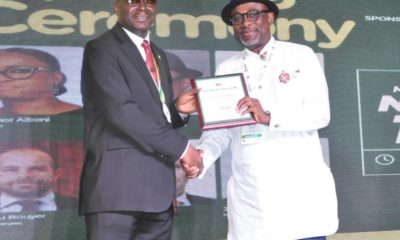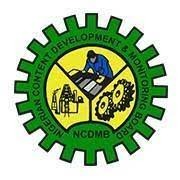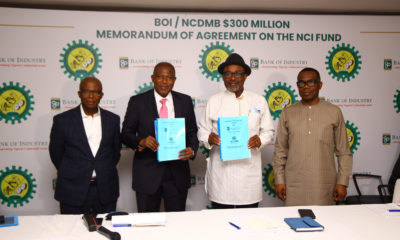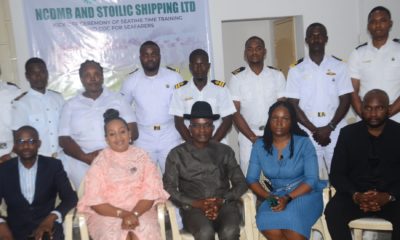Energy
NCDMB Proffers Guideposts For Sustainable Local Content Practice In Africa
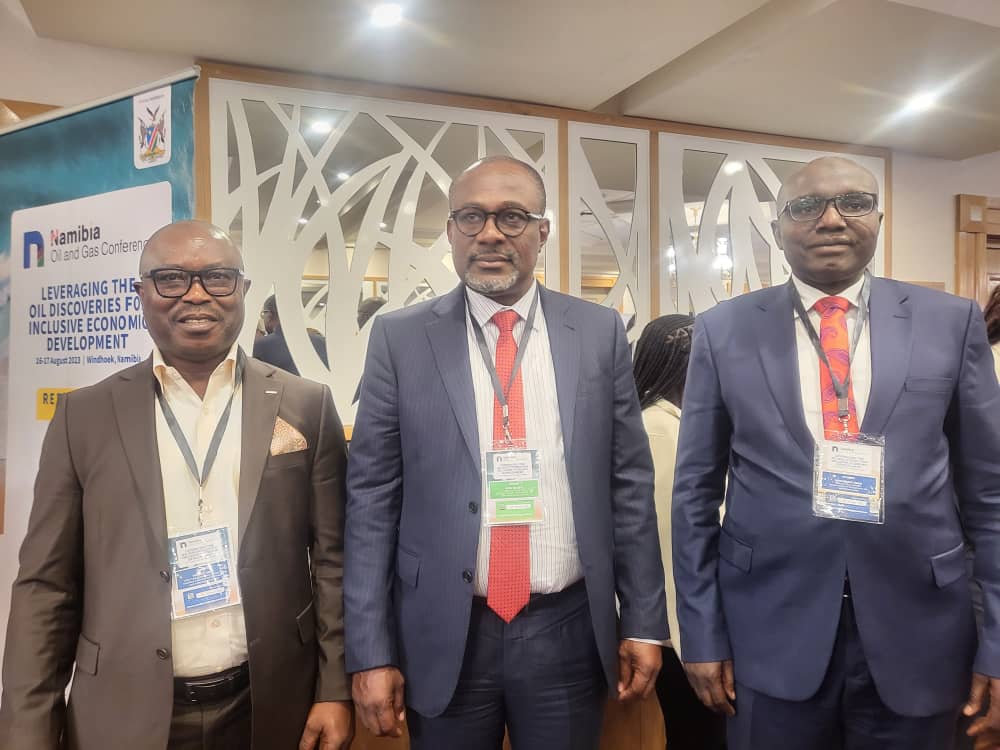
On the heels of remarkable discovery and exploration of oil and gas resources across several countries in Africa, the Nigerian Content Development and Monitoring Board (NCDMB) on Wednesday proffered strategies that would enable those nations to institute sustainable Local Content practices, achieve in-country value addition, and benefit maximally from the exploitation of their hydrocarbon resources.
The Executive Secretary NCDMB, Engr. Simbi Kesiye Wabote offered the suggestions at the two-day Namibia Oil and Gas Conference holding in Windhoek, Namibia. He hinted that Africa currently accounts for about 12% of annual global oil production, but only consumes less than 4% of the global production, describing the situation as potential opportunities in production, processing and utilization of oil and gas within the continent for improvement in the standard of living.
Speaking as the preeminent local content advocate in Africa, the NCDMB boss gave an overview of key parameters that are critical to in-country value addition and growth of the sector on a sustainable basis. These are Regulatory Framework, Gap Analysis, Capacity Building, Funding and Incentives, Research and Development, and Access to Market.
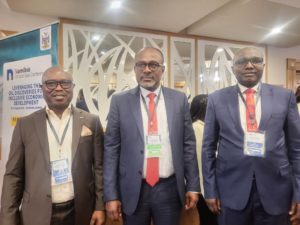
Director Corporate Services NCDMB, Mr. Patrick Obah; Executive Secretary NCDMB, Engr. Simbi Kesiye Wabote and Director Legal Services, Mr. Umar Babangida at the two-day Namibia Oil and Gas Conference held in Windhoek, Namibia.
Citing the example of the Nigerian Oil and Gas Industry Content Development (NOGICD) Act, 2010, he said: “An enabling regulatory framework backed with the appropriate legislation is very fundamental in local content practice,” and that it is “better than directives or policies that are subject to speculations or compliance on ‘best endeavour’ basis. According to him, once such a statute is in place “It is no longer optional or debatable whether to comply with local content requirements.”
Among lessons under the regulatory environment parameter he said, “The law must promote and enable investments rather than become a stumbling block to existing or new investors both locally and internationally,” and that “Provisions should be made in the law to address any lacuna without having to review the entire law such as the provision in the NOGICD Act for utilization of Ministerial Regulations to address any gaps or opportunities.”
Besides, he noted, a regulator “must be pragmatic in applying the law as the oil and gas industry is very dynamic such that aspirational goals and prevailing realities are not always on the same trajectory.”
On Gap Analysis, the NCDMB boss said, “Baseline and periodic gap analyses are essential to determine gaps that are needed to be closed in the areas of skills, facilities and infrastructure.” Lessons learnt so far in that regard show that “All gaps cannot be closed overnight even if you have the resources to do it,” and that it would be necessary to “prioritize areas of high impact and deploy prudent implementation measures.”
Structured capacity building intervention, according to him, “is essential to spur the development of in-country capacities and capabilities,” but implementation of major projects is a prerequisite. In his words, “Continuous and well sequenced stream of major projects is important to sustain utilization of established capacities and attract additional investments for growth.”
Funding and Incentives, he emphasized, are essential to implement local content programs, develop infrastructure, attract new investments, and keep existing businesses afloat where required.” He cited the Nigerian Content Development Fund (NCDF) provided for in the NOGICD Act, which has so far been deployed in the launch of the $350 million Nigerian Content Intervention Fund, the ongoing development of the Nigerian Oil and Gas Parks Scheme (NOGAPS), and construction of the 17-storey corporate headquarters of the Board.
On Research and Development, Engr. Wabote said, “Local content thrives where there are robust Research and Development guidelines to drive development of home-grown technology,” pointing out that in Nigeria there is “a $50 million Nigerian Content Research and Development Fund to drive basic research, commercialization of research breakthroughs, establishment of Centers of Excellence, and to sponsor university endowments.”
Access to Market, the Executive Secretary observed, is very essential, noting that “The policies or laws, the capacities developed, and the research and development efforts will become frustrating if there is no outlet to utilize them and receive reward for sustainability and growth. He equally pointed to “opportunities realizable from the African Continental Free Trade Agreement (AfCFTA).
The presentation of the NCDMB boss was rounded off with an appeal that Namibia do her best “to avoid Dutch Disease syndrome in which rapid development of your oil and gas industry leads to a decline in other sectors of the Namibian economy.”
He added that “this exciting era of oil and gas discoveries and their development should not lead to decline or abandonment of…mining, fishing, agriculture and tourism sectors of the economy.”
The Conference, organised by the Economic Association of Namibia (EAN), Namibia Investment Promotion and Development Board (NIPDB) and the Hanns Seidel Foundation (HSF) in strategic partnership with the National Petroleum Corporation of Namibia (NAMCOR) ended on Thursday.
Energy
NLNG Improves Nigeria’s Domestic LPG Supply Efficiency

In line with its continuous improvement culture, the Nigeria LNG Limited (NLNG) will be working closely with its stakeholders to improve operational efficiency in its domestic Liquefied Petroleum Gas (DLPG) supply in Nigeria.
According to a statement from its General Manager, External Relations and Sustainable Development, Sophia Horsfall, this was highlighted at an engagement session with stakeholders in Lagos.
It was gathered that the NLNG plans to enhance engagement and improve operational efficiency of its LPG supply through digitalisation of some of its processes which include a new platform designed to streamline regulatory processes, optimise risk management, and enhance the buyer experience. The platform will feature IT-supported relationship management, automated issue resolution, centralised real-time payments, and improved case management systems, ensuring a seamless supply process despite market shifts and external pressures.
ALSO READ: Ifon-Ilobu Crisis: Adeleke Assures Of Quick Restoration Of Peace
Manager, Commercial Contract Management, NLNG, Tolulope Longe, reiterated that the planned improvements will enable and consolidate NLNG’s resolve to delivering 100% of its LPG supply to the Nigerian market.
She said a strategic roadmap was in play to ensure the achievement of NLNG’s longstanding goals of LPG being accessible and available in the country, aligning with its vision of being a globally competitive energy company, improving lives sustainably. She also harped on the significance of these improvement initiatives and the Company’s push for LPG utilisation as a clean energy source alternative to kerosene and other fossil fuels
Longe noted that the Company remained focused on growth and sustainability of the LPG market by continuously enhancing its supply processes in collaboration with offtakers. She stressed NLNG’s commitment to collaborating with stakeholders to maintain pricing stability and long-term market viability. While acknowledging industry concerns, she noted the importance of operational efficiency in meeting market demands.
NLNG aims to strengthen stakeholder engagement and improve market efficiency in the LPG sector through enhanced customer interactions, minimised schedule disruptions, timely confirmations and deliveries, and prioritisation of customers with demonstrable capacity. As it adapts to market realities, NLNG remains committed to driving sustainability and delivering lasting value to Nigerians.
Energy
Savannah Energy Completes SIPEC Acquisition

In line with its announcement of 19 March 2024, Savannah Energy has completed the acquisition of Sinopec International Petroleum Exploration and Production Company Nigeria Limited (SIPEC).
Making the revelation, an elated Chief Executive Officer, Savannah Energy, Andrew Knott, said, “We are delighted to announce the completion of the SIPEC Acquisition – the achievement of one of our core business priorities for 2025. Our focus at the Stubb Creek Field will now turn to progressing the expansion project, which we expect to increase production by almost three quarters over the course of 2025/26. I look forward to updating shareholders on this in the coming months, as well as on the progress we make towards achieving the other core business priorities we outlined to shareholders earlier this month.”
He expressed gratitude to the Nigerian government for making the acquisition possible, having required several levels of regulatory approvals.
ALSO READ: Tinubu Plans 10,000 Electric Vehicles For North-East
“I would like to thank the Government of Nigeria for the support that they have shown our Company in approving the SIPEC Acquisition and I extend a warm welcome to the SIPEC employees joining Savannah today,” he added.
Biztellers reports that the SIPEC’s principal asset is the 49% non-operated interest in the Stubb Creek oil & gas field (“Stubb Creek Field”), which is operated and 51% owned by Universal Energy Resources Limited (a Savannah affiliate company).
The SIPEC Acquisition increases Savannah’s Reserves and Resources base by approximately 30% from 151 MMboe to 197 MMboe. It adds 227 Bscf of 2C gross gas Resources at Stubb Creek Field, securing significant additional long-term feedstock gas available for sale to Accugas customers.
It was gathered that the transaction consideration was fully funded through a drawdown under a US$60 million Reserve-Based Lending debt facility arranged by The Standard Bank of South Africa Limited. At completion the cumulative consideration paid was approximately US$35.1 million (inclusive of approximately US$19.5 million of cash available to SIPEC), with US$2 million in deferred cash consideration payable in eight quarterly installments post-completion.
Savannah now intends to commence an up to 18-month expansion programme, which is anticipated to increase Stubb Creek Field gross production from an average of 2.7 Kbopd in 2024 to approximately 4.7 Kbopd.
Stubb Creek Field, located in Akwa Ibom State, Nigeria, is a producing oil field with considerable undeveloped, non-associated 2C gas resources. As at year-end 2024, Stubb Creek Field had an estimated 11 MMstb of 2P gross oil Reserves and 515 Bscf of 2C gross gas Resources1.
Commercial oil production started at Stubb Creek Field in 2015, with cumulative production of 8.1 MMstb to 31 December 2024. Oil produced at Stubb Creek Field is processed through production facilities onsite and then exported to the Qua Iboe terminal via a 25 km pipeline.
The Stubb Creek Field was converted to a 20-year petroleum mining lease in accordance with the Petroleum Industry Act 2021 and effective from 1 December 2023.
Energy
Shell On Place Of Infrastructure In Developing Nigeria’s Gas Resources
Shell has called for the development of infrastructure to promote the growth of domestic gas and monetisation of the resource.
At a panel session at the just concluded Nigeria International Energy Summit (NIES) in Abuja, Managing Director Shell Nigeria Gas (SNG) Ralph Gbobo, said, “The infrastructure will support the delivery of gas from producers to consumers in an efficient way that is also transparent and cost effective.”
Ralph described infrastructure as the bedrock of a thriving gas industry, citing the Escravos – Lagos Pipeline System (ELPS) which feeds the domestic gas market as an example. He said: “If we can fully implement our regulations, a key one being the Network Code and maintain a stable Network where investors can get their returns, I can guarantee that we will see more players come into this space.”
ALSO READ: Shell Exhibition Delivers Value At Energy Summit
SNG which was established in 1988 has led the way in the provision of gas infrastructure in Nigeria, building gas distribution systems in Rivers, Abia and Ogun states through which it delivers gas to over 140 domestic, industrial and commercial customers. Last year, the company signed an agreement with the Oyo State Government to build a gas distribution infrastructure with the intention of delivering gas to businesses in the state and beyond.
Ralph explained: “Our experience at SNG shows that the task of expanding the Nigerian domestic gas market is a collective responsibility and not to be done by just a few players. It requires inputs from the regulatory, upstream, midstream and downstream sectors. The key to unlocking all these inputs is driving and implementing the right polices. The implementation of clear policies and incentives, allows for more investors to come into the domestic gas market be it in terms of gas production or infrastructural development. Investors need to be assured of a stable regulatory and fiscal market where their investments are guaranteed.”
He added: “Shell Companies in Nigeria have invested across the entire value chain of gas — Upstream, Midstream and Downstream having understood the potential of the commodity to accelerate industrial and economic growth in Nigeria.”

